Dentures & Partials in Harrisonburg
Get Your Complete Smile Back

Multiple missing teeth can be a true burden in a wide variety of ways. They can make you less likely to smile because you feel self-conscious, and they can also affect your ability to eat and speak comfortably. At Harrisonburg Family & Cosmetic Dentistry, we help patients faced with this problem by using custom-made, natural-looking dentures and partials. We even offer digital dentures, which streamline your treatment process and provide the highest-quality prosthetics possible.
Who’s a Good Candidate for Dentures?
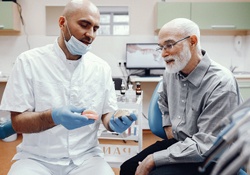
Almost anyone can get dentures, no matter how many teeth you’re missing. Tooth loss is the only major requirement for these dental prosthetics. To be safe, though, you should consult our dentists to see if you’re eligible. They’ll confirm whether dentures are truly right for you. Even if they aren’t, you can become a candidate later with preliminary dental work. Our office can also show you other tooth replacement options. To learn more, just keep reading or call us soon!
Effects of Missing Teeth
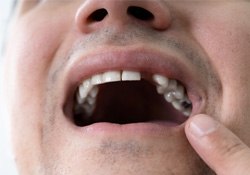
Before looking at treatment factors, you’d do well to review tooth loss’ causes and effects. By doing so, you’ll better grasp how dentures can benefit your oral health.
Ultimately, people can lose teeth for various reasons. You might suffer from gum disease that erodes the tissues securing your pearly whites. On the other hand, your tooth could decay so much that it falls out or needs extraction. A person’s chompers could even get knocked out by an accident or injury.
The effects of tooth loss, meanwhile, are always harsh. The most notable is that it makes eating, speaking, and smiling harder. Still, another downside is that the resulting smile gaps can degrade your jawbone. (This erosion can cause facial collapse if left untreated.) Adding insult to injury, the same spaces can make your remaining teeth tilt and fall.
What Qualifies You for Dentures?

As stated before, most patients can get dentures if they lack teeth. That said, there are other qualifying factors.
Oral health is a good example. You see, dentures don’t just substitute for missing teeth; they can also replace sensitive or decaying ones. However, you can’t get them if your mouth is too unhealthy. Dentures only work well if the patient’s gum and jaw tissues are sturdy enough. To that extent, an ideal candidate must be committed to dental care.
The number of missing teeth is also a relevant issue. Based on how many you’ve lost, you’ll need one of two possible dentures. The first type is a partial model, which only replaces a few teeth. In contrast, the second is the full denture – a type that’s best when all pearly whites along an arch are gone.
Even finances are something worth considering. Truthfully, dentures tend to be cheaper than other restorations. That means they’re pretty good for patients on a tight budget.
Alternative Tooth-Replacement Options

Should we decide you’re not a good dentures candidate, other options exist. Harrisonburg Family & Cosmetic Dentistry has additional restorative treatments you could try. These include:
- Dental Bridges – Usually made of crowns fused to a pontic, a dental bridge is a fixed restoration. It relies on nearby healthy teeth for support and is normally cemented in place.
- Dental Implants – In contrast to dentures or bridges, dental implants are placed directly in the jawbone. This trait means they fuse with your jaw over time. This fusion makes them more secure than other restorations, though it also makes implants a bit expensive.
Types of Dentures
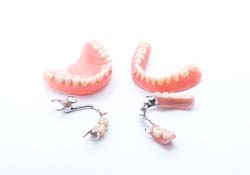
Modern dentistry offers a few different types of dentures, all of which are custom-made to fit a patient’s unique mouth. During your consultation with your dentist in Harrisonburg, we will help you determine which one is best for your circumstances. Here is an overview of the types of prosthetics we offer:
Partial Dentures
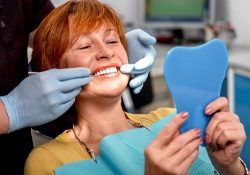
A partial (also known as a partial denture) can be used to replace multiple missing teeth along a single arch while fitting in seamlessly among a patient’s remaining teeth. They can be fabricated to fit a patient’s unique dental structure, and they are held in place using small clasps that attach to neighboring teeth.
Full Dentures

Modern-day dentures are much different than anything your parents or grandparents might have worn. Now, these prosthetics are smaller, sleeker, and more comfortable than ever, consisting of a gum-colored acrylic base attached to realistic-looking teeth. If you are missing an entire row of teeth, we can restore it using a full denture. This will sit directly on the gums using natural suction and/or a bit of denture adhesive.
Implant Dentures
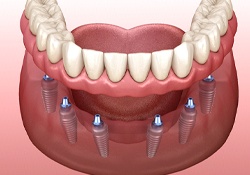
For patients who prefer a more permanent option than traditional dentures, implant dentures are an ideal alternative. They are held in place via prosthetic tooth roots that are surgically inserted into the jaw. While more costly in the beginning, their longevity, functionality, stability, and permanence are just a few of the many reasons so many patients are turning to them these days.
Digital Dentures Provide Streamlined Treatment

Most practices use old-fashioned methods of designing and creating dentures. At Harrisonburg Family and Cosmetic Dentistry, however, we have upgraded our process to include state-of-the-art technology. Digital dentures are designed using a high-tech Prime Scan rather than a manual impression. And instead of the design being sent to the laboratory, we can print the dentures right here in our office! Digital dentures require fewer visits to our office than traditional prosthetics and offer top-tier quality and function.
As your dentist in Harrisonburg, we will even keep the design of your dentures in our records, so if you ever have a mishap with your teeth, we can print a new prosthetic for you right away.
How Dentures Are Made
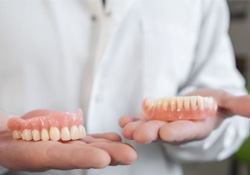
After you decide to commit to dentures, you may wonder about the process in front of you. It can vary a bit from patient to patient, but the basics usually remain the same. Within a matter of weeks, you may have a brand-new smile! Hopefully, learning about the denture creation process will enhance your appreciation for your new prosthetic! Here is an overview of how we go about crafting beautiful, functional, and durable dentures:
What Are Dentures Made Of?
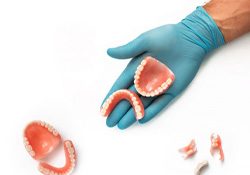
Dentures are composed of two main parts:
- The base. The base of dentures is usually made out of acrylic, though it is sometimes made out of nylon or other materials. The base is gum-colored and custom-designed to work well with the natural curve of your gums.
- The teeth. Often, the teeth of dentures are made out of acrylic or porcelain. Porcelain is more popular for full upper and lower dentures, whereas acrylic is usually the best choice for partial dentures because it is easier on natural teeth.
The Denture Creation Process
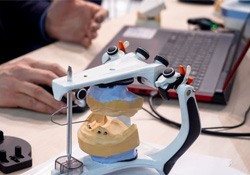
Here is a general overview of the denture creation process:
- Impressions and measurements: Our team will take detailed impressions of your gums. We may use manual impression materials or a digital scanner. Both methods can create an accurate representation of your oral structures. We may also take some detailed measurements of your jaw.
- Laboratory work: Your impressions will go to a dental lab, where the technicians will create a wax version of your gumline and get to work on creating your artificial teeth.
- Fittings: The lab will send us a wax model of your dentures so we can verify that they fit you correctly. We will give them our feedback so they can create the final version of your prosthetic.
- Adjustments: When your denture is ready, you will return to our office so we can double-check that it meets our high quality standards. If any final adjustments are necessary, we will make sure they get taken care of.
Adjusting to Your New Dentures

Adjusting to your new dentures might cause some discomfort at first. Your gums may be sore, and it might be challenging to eat and speak. With time, however, your denture should start to feel like a natural extension of your body. Practice using it as much as possible so you can adapt to how it feels in your mouth. If you experience significant pain or are struggling to get your denture to work for you, you are always welcome to call our team for guidance.
The Benefits of Dentures

While a bit "old school," traditional dentures are still very effective. Dentistry wouldn't view them as a time-tested solution for tooth loss otherwise. Indeed, wearing dentures comes with a slew of perks that can improve your long-term quality of life. Our office will even tell you about them, giving you a preview of how the prosthetics would transform your day-to-day. Just keep reading to learn about the benefits of dentures, or call us to hear more over the phone.
Psychological Benefits

It almost goes without saying that tooth loss harms your mental health. When you have glaring gaps in your grin, you face a higher risk of clinical depression, low self-esteem, and similar issues. Even so, you’re in luck; dentures prevent such moods by restoring your smile. As they fill the unwanted gaps between your teeth, they help you feel confident and self-assured. That change is natural when you don’t have to worry about missing teeth and how they affect your speech, eating, etc.
Clearer Enunciation

If you suffer tooth loss, you’ll inevitably struggle to speak clearly. Your mouth needs teeth to enunciate words, so missing even a few can cause a severe lisp, slurred speech, etc. The good news is that dentures reverse this effect by acting as quality tooth replacements. As their prosthetic teeth support your tongue, they’ll ensure you can form words clearly. You’ll just need to practice with them first and slowly adjust.
Improves Nutrition

Did you know that untreated tooth loss can cause a poor diet? Since it stops you from chewing tough-but-healthy foods, the condition restricts your potential meal choices. This restriction can then trigger indigestion and malnutrition – issues that reduce your body’s strength and energy. Of course, you wouldn’t have to suffer these problems with well-made dentures. Through these restorations’ alternative teeth, you could expand your meal options and boost your nutritional health.
Preserves Oral Health
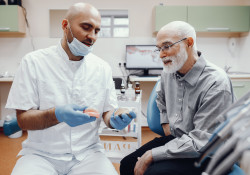
When you have missing teeth, your mouth’s health will slowly but surely decline. The gaps from tooth loss house harmful bacteria, erode your jawbone, and more. Thankfully, the right dentures can preserve your oral health as they fill your grin’s empty spaces. Getting them would reduce the number of “bad” germs in your mouth, keep other teeth from tilting, and slow your jawbone’s erosion. Such effects are nothing to sneeze at!
Expands Opportunities

It’s harder to make good first impressions when your teeth are missing. While a full and pretty smile makes you seem charming, a grin with many gaps causes you to look off-putting. However, dentures could rescue you from this situation; they’d fill your smile with beautiful replacement teeth. Once you have them in your mouth, you could interact smoothly with friends, coworkers, and romantic partners and expand your opportunities.
Understanding the Cost of Dentures

Even if you want dentures, you’d likely prefer to know their price first. (You can’t get a treatment you can’t afford.) However, that approach isn’t possible. The cost of dentures varies by patient, so you must consult our dentists for an exact estimate. Still, you can trust our office to make care more affordable. We at Harrisonburg Family & Cosmetic Dentistry will walk you through dentures’ pricing factors and the available payment options. For more details, just keep reading or contact us soon.
Factors That Affect the Cost of Dentures

As you proceed with denture treatment, our dentists will perform an oral exam. This assessment reviews (among other things) factors related to the final procedure price. These include:
- Need for Prep Work – If your mouth needs “prepping” before you get dentures, the final treatment cost will rise. For example, pulling a tooth to make room will add to the overall expense.
- Denture Base Material – As it happens, a denture’s acrylic base can cost more or less. If the materials used in it are durable and lifelike, it’ll be more expensive.
- Quality of Replacement Teeth – Usually, a denture’s artificial teeth are acrylic or porcelain. Acrylic kinds are cheap but wear quickly, while porcelain ones cost more but are longer-lasting.
As you reflect on the above factors, remember that the cheapest dentures aren’t good. These models use subpar acrylic that doesn’t function well. As such, do your best to select effective and high-quality restorations.
Are Implant Dentures More Expensive?
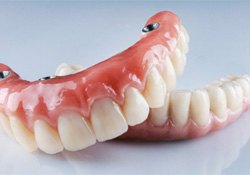
Technically, implant dentures’ upfront cost is higher than that of standard ones. Rest assured, however, that they’re worth the added price.
For starters, keep in mind that implant dentures use dental implants. The latter restorations fuse with your jaw, ensuring the whole appliance is secure and permanent. Therefore, these dentures won’t slip or fall like other types do. Better yet, the implant fusion makes them look and act like natural teeth.
At the same time, an implant denture makes for a good long-term investment. Since its implants can last 15-30 years, they have a longer lifespan than ordinary dentures. That means their (initially) high cost is offset by the need for fewer repair and replacement visits.
Does Dental Insurance Cover Dentures?

Fortunately, dental insurance usually covers dentures. They’re often counted as a major procedure by plan providers. As a result, a given dental policy will usually match up to 50% of a denture’s cost.
With that said, exceptions do exist. Your insurance plan may limit its denture coverage. Given this fact, try to confirm your benefits before treatment. Our staff can even help you do so if assistance is needed.
Other Options for Making Dentures Affordable

Whether you have insurance or not, there are other ways to make dentures affordable. The most notable of these are a practice’s unique payment options. Should you get the right one, your ideal dentures won’t have to “break the bank.”
For example, look at our own Harrisonburg Family & Cosmetic Dentistry. We happen to provide things like:
- Special Offers – Currently, our practice is running a special offer on implant dentures. You can get a free 30-minute consultation regarding this treatment, which includes an evaluation of your existing restorations.
- Flexible Financing – We work with CareCredit, a reputable third-party financier. Through them, you could pay the cost of dentures via low-interest monthly installments. That way, you could cover the expense gradually instead of all at once.
As you can see, we’re ready to make your artificial teeth pretty and budget-friendly. So, book a consultation with our office to get affordable dentures soon!
Dentures Aftercare
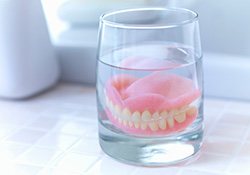
Dentures can help improve your smile’s appearance and functionality regardless of how many natural teeth you have remaining. But that doesn’t mean you no longer need to be concerned about your oral health.
You should maintain healthy dental hygiene habits to prevent bacteria from forming plaque on the surface of your dentures, which can contribute to periodontal problems and other concerns. Read on to learn how to properly care for your new teeth so you can continue to enjoy their many advantages!
Removable Dentures
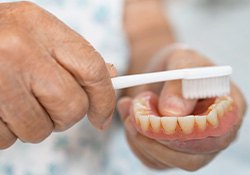
Remove After Eating
Your dentures close the gaps in your grin so you can bite and chew a wider variety of wholesome foods that support your oral well-being. However, leftover food can cling to their surfaces and attract harmful germs that can thrive, causing gum disease that can spread to your jawbone if left untreated.
Thankfully, you can prevent this by taking a few moments after your meal to carefully rinse your restoration under running water. Please remember to use cool or lukewarm water, as hot temperatures can warp the base so it no longer fits correctly in your mouth.
Clean Your Restoration
You should also maintain a twice-daily dental hygiene routine. You should remove your prosthetics in the morning and at night to gently brush all sides with a soft-bristle toothbrush and clear dish soap that won’t abrade the materials.
Then, be sure to cleanse your gums and tongue before rinsing off your dentures to reinsert them. This ensures that you’re putting your new teeth back into a clean mouth to avoid trapping germs against your connective tissues.
Keep Your Dentures Safe
These prosthetics are notorious for becoming slippery when wet and are prone to falling from your fingertips during cleanings. Unfortunately, if they tumble from a high enough height or land on a hard surface, they can be chipped, cracked, or broken altogether.
You can help your dentures remain in good shape by placing a soft towel or cushion beneath you when you wash them. You might also want to store them out of reach of small pets or children, who might not handle them carefully, when you’re not wearing them.
Remove Dentures When You Sleep
You might feel tempted to fall asleep with your teeth still inserted, but this isn’t usually recommended. It forms a tight bond against your connective tissues to remain firmly in place all day, which reduces circulation to your gums. This increases the likelihood of developing sores, gum disease, or infection, which makes it uncomfortable to wear your restoration.
You can leave them to soak in a glass of room temperature water or special denture solution overnight to help them maintain their shape while killing germs so they’re fresh and clean for you in the morning.
Notice Changes
Paying attention to your own dental condition helps you spot changes that might point to a more serious underlying concern. For instance, if you notice your gums look darker or puffier than usual, you might already have developed gum disease requiring attention.
Also, if you notice your dentures are damaged, please don’t try to fix them yourself at home. Super glue and other household products are not intended for oral use and might be toxic if ingested. Contact our team, and we’ll repair, reline, or replace your restoration depending on your unique needs.
All-on-4 Dentures
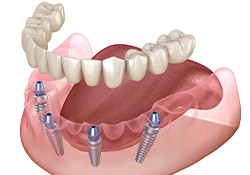
If you’ve opted for All-on-4 dentures, your aftercare will look different because your restoration is a more permanent part of your mouth. Unlike the standard solution, these teeth aren’t intended to be removed every morning and night for cleanings. Once they’re anchored to your dental implants, they shouldn’t be taken out except by a qualified professional.
You can maintain them by brushing and flossing twice daily with a non-abrasive toothpaste. If you’re struggling to clean the space between your gums and your dentures, a floss threader or oral irrigator might help. You should also visit our office for a checkup and cleaning every six months so we can monitor your condition and treat any areas of concern before they progress.
Dentures FAQs
Can I eat normally with dentures?
While the early stages of denture-wear might make eating a bit more awkward, you can expect the adjustment phase to last only a short while. Your taste buds may be a bit off in the beginning but by following these easy steps, you’ll be eating like normal with your new dentures:
- Opt for softer foods in the beginning (i.e. eggs, fish, cooked vegetables, pudding)
- Use your back teeth to chew, using both sides at the same time
- For easier consumption, cut up larger pieces of food
How much pain is involved with getting dentures?
You can expect some minor discomfort and irritation when first being fitted for dentures. Your mouth has become accustomed to not having teeth, so it will take some time to adjust. If this is the first time you’ve ever worn dentures, you can expect the pain to last a bit longer, but if you’re receiving a new set, it may not take quite as long to adjust to the newness. Keep in mind, if you require any teeth to be removed before receiving dentures, it is highly likely that the areas in which your extractions were performed will be sore and tender for quite some time, so you’ll need to make sure you’re taking proper measure to heal.
What do I do if my dentures pop up while eating?
If this happens, it may be that your dentures do not fit quite as well as they should. Schedule an appointment with us and allow our team to examine your restoration and oral structure. By improving the fit, you should be able to eat normally without any problems whatsoever.
How do you know when it’s time to reline dentures?
Age can cause a shift in your jaw, resulting in your dentures no longer fitting properly. When this happens, you will need to have them relined, which will require your dentist to refit the base of your dentures. This will not only ensure they fit more snugly and comfortably, but it will reduce the likeliness that you will experience slippage or your dentures falling out.
Can I sleep in my dentures?
While it is possible for you to sleep in your dentures, it is recommended that you perform proper oral hygiene practices to keep them clean. Typically, dentures are cleaned at night and allowed to soak while you sleep. It is best if they are removed, so as to give your gums and bone a chance to relax from all the pressure your denture can cause.

